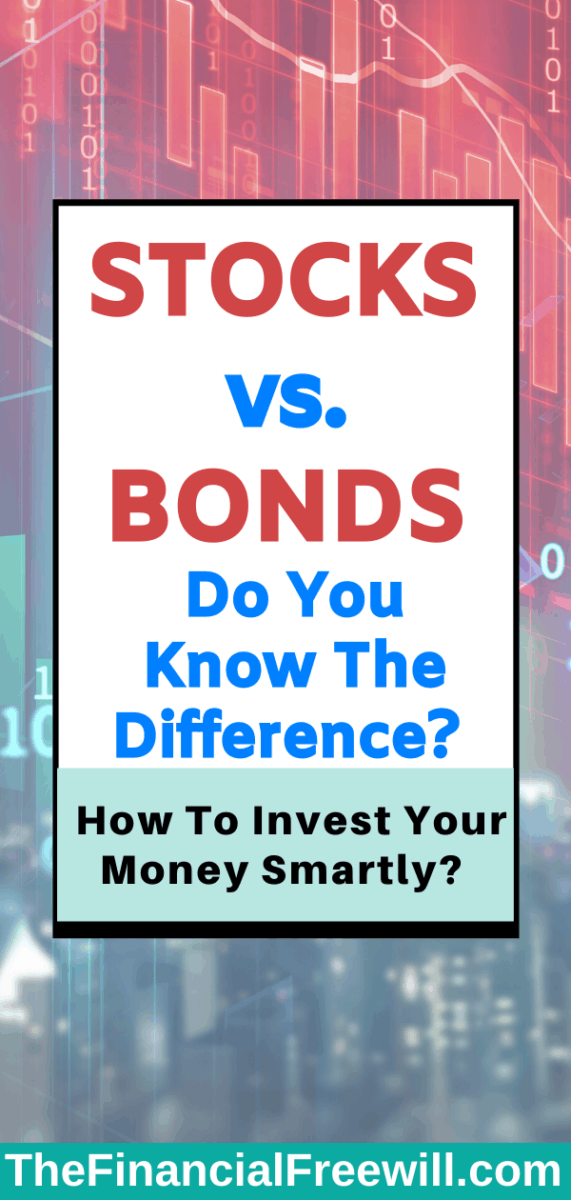This article may contain affiliate links. I might earn a small commission if you make any purchases through my links and it comes at NO cost to you. For more information, please read my Disclaimer page.
So you are ready to invest your hard-earned money? And you’ve heard about the various investment options available in the market. In particular, the stocks vs. bonds investment options.
You do a quick google search and countless articles related to stocks and bonds pop up. So, what really are stocks and bonds? How do they differ in investment? What option should you choose to invest your money?
There is no one-size-fits-all when it comes to investments. The right answer is the one that works for you and helps you achieve your financial goals.
So, before you take a deep dive, I’d suggest you carefully read and understand the below 3 key aspects of investments:
a. Know Your Risk Appetite
You need to know your risk appetite whether you invest in stocks vs. bonds. This is the key! Not everyone is the same, and hence you need to cater to your investment choices based on your risk appetite. Thanks to Schwab, you can find your risk tolerance level here. Once you know your risk tolerance level, you can look into company stocks that fit your style and goals.
b. Compounding
Compounding is a process in which you take the returns from the investment and re-invest it. In other words, the amount you gained helps you earn even more.
Example: Let’s say you invested $1000 at 5% return for 1 year. At the end of 1 year, you will receive $1000 + ($1000 * 5% = $50) = $1050. Next, you invest the entire $1050 at the same 5% return for another year. At the end of year 2, you will receive $1050 + ($1050 * 5% = $52.5) = $1,102.5 and at the end of 10 years, it will be $1,628.9.
c. Diversification
Even if you are new to investing, I am sure you must have heard the saying: Never put all your eggs in one basket. Diversification is precisely that – do not put all your money in any one investment option. Try to diversify and spread your money across various options.
Now, let’s take at the 2 investment options Stocks and Bonds.
Download FREE Budget Checklist
>> 50+ List of Budget Items
>> Budget Items categorized into 3 sections: Income, Fixed Expenses, Variable Expenses

Stocks
A stock is also known as an “equity” or “a share” in the financial market. It is a type of security that gives the buyer the opportunity to own a proportion in the issuing company.
In exchange, the issuing company gets money based on the number of stocks purchased.
Stocks are one of the most commonly traded securities in the financial market. They are very popular both with banks and retail investors (like you and me) because of the ease of transacting.
Stocks can be traded on exchanges like DOW, NASDAQ and NYSE and both the buying and selling happens online.
As they say, investing is both an art and a science. People buy and sell shares based on the company’s health and performance (fundamental analysis) and(or) by looking at charts, historical trends and price movements (technical analysis).
Investing in stocks yields higher returns in lesser time than most other forms of investing (depending on a lot of factors though). For this reason, investing in stocks vs. bonds is one of the most popular types of investments for beginners across the globe.
So, what do you need to get set up for trading stocks?
- Clearly defined risk appetite from above – you can use Low, Medium and High to start with
- A brokerage account
- Funds set aside (no matter how small the amount) apart from your savings and emergency fund
For brokerage accounts, look at Fidelity, TD Ameritrade, Etrade, Charles Schwab to set up your account. Your focus should be to have a brokerage account that not only allows you to trade cheaper but also provides learning tools, webinars, and easy to use trading platforms.
I use Fidelity, TD Ameritrade, and Etrade.
I highly recommend you choose at least a couple of brokerage accounts irrespective of investing in stocks vs. bonds. This will help you understand the pros and cons of each, and you can ultimately make one of them your primary one.
Stocks can be classified into 3 categories:
1) Growth Stocks
2) Value Stocks
3) Income Stocks
1) Growth Stocks
Growth stocks are stocks of those companies that have significant potential for future growth. The pace at which these companies grow is faster than the other companies in the market.
From a revenue standpoint, growth companies attribute their current revenue toward future expansion. They also focus on reinvesting their profits back into their business to promote innovation and advancement.
Examples of Growth stocks:
–Alphabet (Google) – GOOGL
–Facebook – FB
–Netflix – NFLX
2) Value Stocks
Stocks that are undervalued and have more value than currently perceived are called undervalued stock. This means that the value stock is currently trading at a price lower than where it should be based on the company’s financial position.
Also, there could be a one-off operational or business related issue with the company that led to a temporary drop in stock price.
Value stock carry less risk vs. Growth stocks and investors who do their homework realized the upside and buy the stock.
Examples of Value stocks:
–3M – MMM
–Aflac – AFL
–Bank of America – BAC
3) Income Stocks
As the name implies, income stocks are those that provide steady and regular dividends (income.) Most of the income stocks have low volatility vs. the overall market and they offer higher dividend yield (return.)
If you are a conservative investor, income stock could be a good addition to your portfolio. Income stocks are less riskier vs. growth and value stocks.
Examples of Income stocks:
–BP – BP
–Citigroup – C
–Walmart – WMT
FREE Daily Expense Tracker!
>> Your FREE 365-Day Tracker that can help you track daily expenses!
>> 12 monthly sheets for ease of tracking expenses
>> Customized for every year and no updates required
Pros Of Investing In Stocks
–> The return on a stock is higher than a savings or a money market account
–> You can quickly diversify your investment by investing in as many numbers of companies. This will spread your risk across different companies
–> Most of the stocks are traded on an exchange and hence the liquidity is very high; meaning, you can buy and sell quickly
–> Some companies also offer dividends (for, e.g., $1 for every share you own). Let’s say you own 100 shares of a company; you tend to earn an additional $100 just for owning the stock
Cons Of Investing In Stocks
–> They are riskier than any of the other safe investment options
–> The stock price can be very volatile especially during bad market days and you could potentially lose all your investment if the company goes bankrupt
–> You need to spend time researching and analyzing the company before you buy stocks
Related Article: How To Start Investing In Stocks

Bonds
Bonds are classified as debt instruments – meaning you are going to loan money to a company and in return, they pay you interest periodically (usually semi-annually).
Bond has a maturity period, and once the bond hits maturity, you get the initial amount loaned to the company, back.
Investment in bonds is less risky than stocks. A bond’s value will not fluctuate sporadically day over day. Interest rates are a key factor in the determination of the bond’s value.
A bond’s value will either rise or fall depending on the direction of interest rates. Bonds are a great investment for those who like safer and conservative investment tools.
It provides the much-needed balance to your portfolio and brings in regular interest payments that you can re-invest.
So, how do you make money by investing in bonds?
- Hold the bond until the maturity and keep collecting those interest payments
- When the bond’s market value rises, you can sell it and pocket the difference between your buying and selling price
Unlike stocks, you cannot trade bonds through the exchanges. Bonds are bought and sold through brokers (referred to as over-the-counter OTC). This does make it a little challenging to buy and sell bonds.
But, there is enough opportunity to add a steady income flow to your portfolio so I would encourage you to go that extra mile!
For a balance portfolio, Bonds are one of the popular types of investments for beginners.
Your best option is to reach out to your brokerage firm for investing in bonds.
According to US News, here are the best Corporate Bonds to invest.
According to US News, here are the best Fixed Income funds to invest.
FREE Daily Expense Tracker!
>> Your FREE 365-Day Tracker that can help you track daily expenses!
>> 12 monthly sheets for ease of tracking expenses
>> Customized for every year and no updates required
Pros Of Investing In Bonds
–> They are safer than stocks
–> Corporate bonds are available in both fixed and floating interest rates
–> The yield (return) is higher than Savings account, CDs and T-bills
Cons Of Investing In Bonds
–> They carry higher risk vs. US government bonds, CDs and T-bills.
–> The fluctuations in interest rates influence the interest payment on the corporate bond. The value is inversely proportional to the change in interest rates.
Related Article: How To Invest Money
Download FREE Budget Checklist
>> 50+ List of Budget Items
>> Budget Items categorized into 3 sections: Income, Fixed Expenses, Variable Expenses

Final Thoughts
There is no right or wrong answer when it comes to choosing stocks vs. bonds. Every individual has a different risk appetite and diversification needs.
So, what works for me might not necessarily work for you.
Also, weigh the fact that you can earn double-digit returns when investing but at the same time, you can lose it all in a matter of minutes/days. Hence, make sure that your investment goals (irrespective of your choice between stocks vs. bonds) are aligned with your overall financial goals.
What are your thoughts on investments? What process do you follow? Please share your experience, thoughts, tips, and ask away any questions in the comment section below!


This is great information! My husband has done some of this stuff for us but I never really understood it all!
Thanks Nicole!
Thanks for explaining these in bits. I never really understood the entire stocks and bond thing.
Glad you found it helpful!
This is so detailed, I’ve been looking for articles to help me as I want to start investing but I’m a little bit puzzled on how to start and where to start from. Thanks for sharing, this has helped a lot.
Thanks Rebiah! There are other articles under Investment on the site so check it out if you looking for more information.
Thank you for this very helpful post! Stocks and bonds can be very confusing at times, this helps define the two.
Glad you found it helpful Grace!
I am trying to teach my daughter some financial wisdom. This has increased my understanding to a level where I could sound like I know what I’m talking about when I speak to her. Thanks
Awesome! Glad you found it helpful!
This is a great guide for those who are just getting started with investing!
Thank you for the awesome post!
Thanks Tegan ????